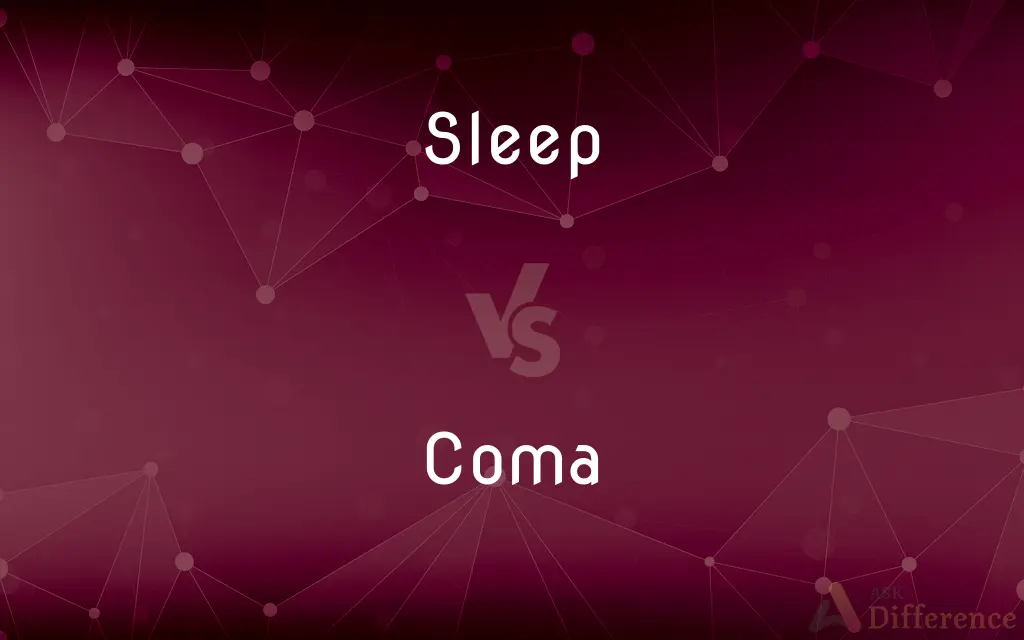Sleep vs. Coma — What's the Difference?
Edited by Tayyaba Rehman — By Fiza Rafique — Updated on April 19, 2024
Sleep is a natural, reversible state of reduced responsiveness and activity, essential for rest and recovery. Coma is a prolonged, unconscious state, often resulting from severe illness or injury, characterized by a lack of awareness and wakefulness.

Difference Between Sleep and Coma
Table of Contents
ADVERTISEMENT
Key Differences
Sleep is a regular, daily state of rest that every human requires for health and well-being, marked by an easily reversible disconnection from the surrounding environment. Whereas coma is an extended state of unconsciousness where individuals do not awaken or respond to stimuli, and recovery is uncertain and can be prolonged.
During sleep, the brain cycles through various stages, including REM and non-REM sleep, which are crucial for memory consolidation and physical recovery. On the other hand, a coma does not involve these cycles and is not restorative or beneficial to brain function.
Individuals can enter sleep voluntarily and usually cycle in and out of sleep stages predictably each night. In contrast, a coma is typically induced by significant health issues such as brain injuries, severe medical conditions, or drug overdoses and is not entered voluntarily.
Sleep is characterized by the potential for dreaming and some degree of sensory processing. However, a coma represents a deeper level of unresponsiveness, where there is no dreaming and very limited, if any, processing of external stimuli.
The duration of sleep is typically a few hours each day and is part of the natural rhythm of the human body. Conversely, a coma can last for days, weeks, or even longer, and the duration often depends on the severity of the underlying cause.
ADVERTISEMENT
Comparison Chart
Nature
Natural, reversible
Unnatural, uncertain reversibility
Purpose
Restorative and essential for health
Non-restorative, indicative of severe issues
Control
Voluntary entry and exit
Involuntary and caused by external factors
Brain Activity
Cycles through stages including REM sleep
Does not cycle; minimal to no brain activity
Duration and Rhythm
Short-term and cyclical (daily)
Long-term and continuous without rhythm
Compare with Definitions
Sleep
A state of rest for the body and mind, during which consciousness is altered and sensory activity is reduced.
She gets eight hours of sleep every night to feel refreshed.
Coma
A prolonged state of deep unconsciousness, typically caused by disease or injury.
The car accident left him in a coma for two weeks.
Sleep
A natural, periodic suspension of consciousness during which the powers of the body are restored.
Teenagers often need more sleep than adults.
Coma
An extended period of unconsciousness from which it is difficult or impossible to awaken.
Doctors are testing his brain activity to assess the depth of his coma.
Sleep
A condition of body and mind such as that which typically recurs for several hours every night.
Without enough sleep, he becomes irritable and unfocused.
Coma
A state of profound unconsciousness associated with ill health.
Her coma was induced by a severe reaction to medication.
Sleep
A state resembling or characterized by sleep, such as inactivity or inertia.
The town fell into a deep sleep after midnight.
Coma
A condition marked by the absence of wakefulness and the inability to react to external stimuli.
He has been in a coma for three months following his illness.
Sleep
The act of sleeping, especially when regular and extending for some time.
I went to sleep around 10 PM last night.
Coma
A medical condition where a person is unresponsive to their environment.
The patient was in a coma, unresponsive to any stimuli.
Sleep
Sleep is a naturally recurring state of mind and body, characterized by altered consciousness, relatively inhibited sensory activity, reduced muscle activity and inhibition of nearly all voluntary muscles during rapid eye movement (REM) sleep, and reduced interactions with surroundings. It is distinguished from wakefulness by a decreased ability to react to stimuli, but more reactive than a coma or disorders of consciousness, with sleep displaying different, active brain patterns.
Coma
A coma is a deep state of prolonged unconsciousness in which a person cannot be awakened, fails to respond normally to painful stimuli, light, or sound, lacks a normal wake-sleep cycle and does not initiate voluntary actions. Coma patients exhibit a complete absence of wakefulness and are unable to consciously feel, speak or move.
Sleep
A natural periodic state of rest for the mind and body, in which the eyes usually close and consciousness is completely or partially lost, so that there is a decrease in bodily movement and responsiveness to external stimuli. During sleep the brain in humans and other mammals undergoes a characteristic cycle of brain-wave activity that includes intervals of dreaming.
Coma
A state of deep, often prolonged unconsciousness, usually the result of injury, disease, or poison, in which an individual is incapable of sensing or responding to external stimuli and internal needs.
Sleep
A period of this form of rest.
Coma
(Astronomy) The nebulous luminescent cloud surrounding the nucleus of a comet and composed of material evaporated from the nucleus when the comet is near the perihelion of its orbit. The nucleus and coma together form the head of a comet.
Sleep
A state in which a computer shuts off or reduces power to its peripherals (such as the display or memory) in order to save energy during periods of inactivity.
Coma
(Botany) A usually terminal tuft or cluster, especially a tuft of hairs on a seed, as on a willow or milkweed seed.
Sleep
(Botany) The folding together of leaflets or petals at night or in the absence of light.
Coma
(Physics) A diffuse, comet-shaped image of a point source of light or radiation caused by aberration in an optical system.
Sleep
A crust of dried tears or mucus normally forming around the inner rim of the eye during sleep.
Coma
A state of unconsciousness from which one may not wake up, usually induced by some form of trauma.
Go into a coma
Slip into a coma
Come out of a coma
Sleep
To be in the state of sleep or to fall asleep.
Coma
(astronomy) A cloud of dust surrounding the nucleus of a comet.
Sleep
To be in a condition resembling sleep.
Coma
(optics) A defect characterized by diffuse, pear-shaped images that in an ideal image would appear as points.
Sleep
To pass or get rid of by sleeping
Slept away the day.
Went home to sleep off the headache.
Coma
(botany) A tuft or bunch, such as the assemblage of branches forming the head of a tree, a cluster of bracts when empty and terminating the inflorescence of a plant, or a tuft of long hairs on certain seeds.
Sleep
To provide sleeping accommodations for
This tent sleeps three comfortably.
Coma
A state of profound insensibility from which it is difficult or impossible to rouse a person. See Carus.
Sleep
(intransitive) To rest in a state of reduced consciousness.
You should sleep eight hours a day.
Coma
The envelope of a comet; a nebulous covering, which surrounds the nucleus or body of a comet.
Sleep
(transitive) To be slumbering in (a state).
To sleep a dreamless sleep
Coma
A tuft or bunch, - as the assemblage of branches forming the head of a tree; or a cluster of bracts when empty and terminating the inflorescence of a plant; or a tuft of long hairs on certain seeds.
Sleep
To achieve or make happen by manner of sleep.
Sleep your way to good health.
He hoped to sleep his troubles away.
Coma
A state of deep and often prolonged unconsciousness; usually the result of disease or injury
Sleep
(transitive) To accommodate in beds.
This caravan can sleep four people comfortably.
Coma
A usually terminal tuft of hairs especially on a seed
Sleep
(intransitive) To be careless, inattentive, or unconcerned; not to be vigilant; to live thoughtlessly.
Coma
(astronomy) the luminous cloud of particles surrounding the frozen nucleus of a comet; forms as the comet approaches the sun and is warmed
Sleep
(intransitive) To be dead; to lie in the grave.
Sleep
(intransitive) To be, or appear to be, in repose; to be quiet; to be unemployed, unused, or unagitated; to rest; to lie dormant.
A question sleeps for the present; the law sleeps
Sleep
To wait for a period of time without performing any action.
After a failed connection attempt, the program sleeps for 5 seconds before trying again.
Sleep
To place into a state of hibernation.
Sleep
To spin on its axis with no other perceptible motion.
When a top is sleeping, it is spinning but not precessing.
Sleep
To cause (a spinning top or yo-yo) to spin on its axis with no other perceptible motion.
Sleep
(uncountable) The state of reduced consciousness during which a human or animal rests in a daily rhythm.
I really need some sleep.
We need to conduct an overnight sleep test to diagnose your sleep problem.
Sleep
An act or instance of sleeping.
I’m just going to have a quick sleep.
Sleep
A night.
There are only three sleeps till Christmas!
Sleep
(uncountable) Rheum, crusty or gummy discharge found in the corner of the eyes after waking, whether real or a figurative objectification of sleep (in the sense of reduced consciousness).
Wipe the sleep from your eyes.
Sleep
A state of plants, usually at night, when their leaflets approach each other and the flowers close and droop, or are covered by the folded leaves.
Sleep
The hibernation of animals.
Sleep
To take rest by a suspension of the voluntary exercise of the powers of the body and mind, and an apathy of the organs of sense; to slumber.
Watching at the head of these that sleep.
Sleep
To be careless, inattentive, or uncouncerned; not to be vigilant; to live thoughtlessly.
We sleep over our happiness.
Sleep
To be dead; to lie in the grave.
Them also which sleep in Jesus will God bring with him.
Sleep
To be, or appear to be, in repose; to be quiet; to be unemployed, unused, or unagitated; to rest; to lie dormant; as, a question sleeps for the present; the law sleeps.
How sweet the moonlight sleep upon this bank!
Sleep
To be slumbering in; - followed by a cognate object; as, to sleep a dreamless sleep.
Sleep
To give sleep to; to furnish with accomodations for sleeping; to lodge.
Sleep
A natural and periodic state of rest during which consciousness of the world is suspended;
He didn't get enough sleep last night
Calm as a child in dreamless slumber
Sleep
A torpid state resembling sleep
Sleep
A period of time spent sleeping;
He felt better after a little sleep
There wasn't time for a nap
Sleep
Be asleep
Sleep
Be able to accommodate for sleeping;
This tent sleeps six people
Common Curiosities
Can a person in a coma hear what’s happening around them?
It's uncertain; some studies suggest minimal perception, but typically, comatose patients do not consciously process sounds.
What are the causes of a coma?
Common causes include severe head injuries, brain inflammation, strokes, and drug overdoses.
Can lack of sleep lead to health problems?
Yes, insufficient sleep is linked to various health issues, including obesity, heart disease, and impaired cognitive function.
What is the main difference between sleep and coma?
Sleep is a natural, daily, restorative state, while coma is an extended, often medically serious state of unconsciousness.
How long can a coma last?
A coma can last for a few days to several years, depending on the cause and severity.
Is sleep beneficial for brain health?
Yes, sleep plays a critical role in brain function, including memory consolidation and clearing metabolic waste.
What are the signs that someone is just sleeping rather than in a coma?
Sleep involves periodic waking and responsiveness to external stimuli; coma involves sustained unresponsiveness.
How do doctors determine if someone is in a coma?
Through neurological exams that assess responsiveness and brain activity.
What treatment options are available for comatose patients?
Treatments focus on the underlying cause and may include medications, surgery, and life support.
How does sleep affect physical health?
Sleep supports various functions, including immune system efficiency and cellular repair.
What is REM sleep and how does it relate to regular sleep?
REM sleep is a stage of sleep characterized by rapid eye movement and dreaming, crucial for emotional regulation and memory.
What is the Glasgow Coma Scale?
It's a scale used to assess the severity of unconsciousness in comatose patients.
Can someone recover from a coma?
Yes, recovery is possible, but the extent varies and sometimes may involve significant long-term impairment.
Is a medically induced coma the same as natural coma?
No, a medically induced coma is a temporary, controlled state to protect the brain during certain treatments.
How does the body sustain itself during a long coma?
Nutritional and physiological needs are typically managed medically with intravenous fluids and other support systems.
Share Your Discovery

Previous Comparison
Reference vs. Inference
Next Comparison
Court vs. TrialAuthor Spotlight
Written by
Fiza RafiqueFiza Rafique is a skilled content writer at AskDifference.com, where she meticulously refines and enhances written pieces. Drawing from her vast editorial expertise, Fiza ensures clarity, accuracy, and precision in every article. Passionate about language, she continually seeks to elevate the quality of content for readers worldwide.
Edited by
Tayyaba RehmanTayyaba Rehman is a distinguished writer, currently serving as a primary contributor to askdifference.com. As a researcher in semantics and etymology, Tayyaba's passion for the complexity of languages and their distinctions has found a perfect home on the platform. Tayyaba delves into the intricacies of language, distinguishing between commonly confused words and phrases, thereby providing clarity for readers worldwide.
















































